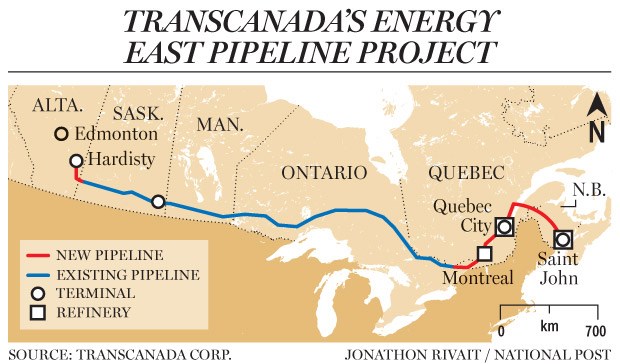The $11 billion Energy East pipeline seems to have become the new bone of contention between the eastern and western provinces. While Saskatchewan is touting it as a safe and economical option for transporting oil across the country, Ontario and Quebec are blocking the project due to a few environmental and economic concerns.
“What seems to be causing the most concern, in terms of Ontario’s and Quebec’s position, is the issue of greenhouse gases,” said Saskatchewan Premier Brad Wall during a media scrum on the day the provincial government made the motion. “We need to make the point to our friends across the country that while rail-carring oil is one of the ways we move oil even today, it may not be the safest. The pipeline is the safest way to do it.”
Essentially, Wall said that there is already a national process in place that evaluates safety, community engagement, and comments from First Nations. Ontario and Quebec should let that process work.
“Those two provinces are creating new barriers, which will harm their own economies and the economies of western provinces who are net contributors to the billions of dollars of equalization payments Ontario and Quebec receive each year,” said Wall in a government news release. “In addition, moving oil by pipeline is far safer and far more environmentally-friendly than moving it by rail car, which is what we are doing now. Why would they oppose that?”
As usual, the answer seems to be about more than just environmental footprints. Apparently, some key industry leaders and natural gas distribution companies are worried they’ll be ripped off if the pipeline switches from gas to oil. With that said, the Ontario and Quebec governments are being pressured to protect the interests of said customers and are planning to intervene in the National Energy Board review. The review will take place after TransCanada Corp. (owners of the pipeline project) file for regulatory approval later this month.
Moreover, during a hearing last month by Quebec’s regulatory body, Régie de L’énergie, Indian company IFFCO Canada Enterprises Ltd. said it would halt plans for a $1.6 billion fertilizer plant if it can’t guarantee a reasonably priced source of gas. To further add pressure to Quebec, their biggest gas distributor, Gaz Métro, disapproves of the pipeline project, as they believe it could weaken competitiveness between central Canada’s energy-focused industries.
In Ontario’s case, opposition is coming from their Union Gas ltd. and Enbridge Gas Distribution.
Either way, somebody is going to lose out. Either the industries lose some gas transportation capacity, or the west won’t be able to shift some oil transportation from rail to pipeline. If TransCanada can figure out a way to shift transportation of some of the product to the underutilized pipelines rather than reducing gas flow of those running at capacity, everyone’s problems might be solved.
Nevertheless, TransCanada is saying that it can still guarantee gas service to its long-term contract customers and that service will be cheaper due to an enhanced ability to maximize on their facilities. The only way they can get the green light is if the National Energy board approves them, which can be difficult if provincial and local governments decide to fight it.
If it does get approved, Wall says this is a chance for Canada to break away from its dependence on Middle Eastern oil and instead refine and use its own oil.
“Today in Canada, even though we’re an energy superpower, even though we’re one of the most prolific producers of oil in the world, parts of our country import oil from Iraq, Algeria, Saudi Arabia, Venezuela, the United States,” he said. “This doesn’t make a lot of sense. So, among other things, Energy East will address that. It will completely displace foreign oil in Canada – in Eastern Canada – and in addition to that, we’ll be adding value to our own oil, because the refineries out there will use it.”
Adding to all of this economic turmoil of course is opposition from environmental groups. Amongst the many concerns is that the pipeline would destroy more forestry and that oil spills will be harder to identify (as opposed to rail cars). According to Wall, however, this pipeline alternative is still safer.
“Especially with lighter sweeter crude, you have an oil that is more incendiary and we have seen in the most tragic ways what can happen in a rail accident involving light sweet crude oil,” he said. “So here is a safer way to transport the oil, and we want to make that case as well.”
With regards to the issue of greenhouse gases, Wall said those problems are immeasurable and yet can be applied to any industry and still remain insurmountable. As such, measuring such things such carbon dioxide and other greenhouse gases shouldn’t be attached to the approval of the project.
“So that’s what we’re saying in this process— let’s not add indefinable measures, like what they’re talking about now with greenhouse gases,” he said. “We can have a debate and companies can say, ‘Well, here’s what we think our CO2 footprint might be,’ but let’s not attach it to approval of a project that literally helps us to stop buying Middle Eastern oil in Canada and refine our own oil right here at home.”



